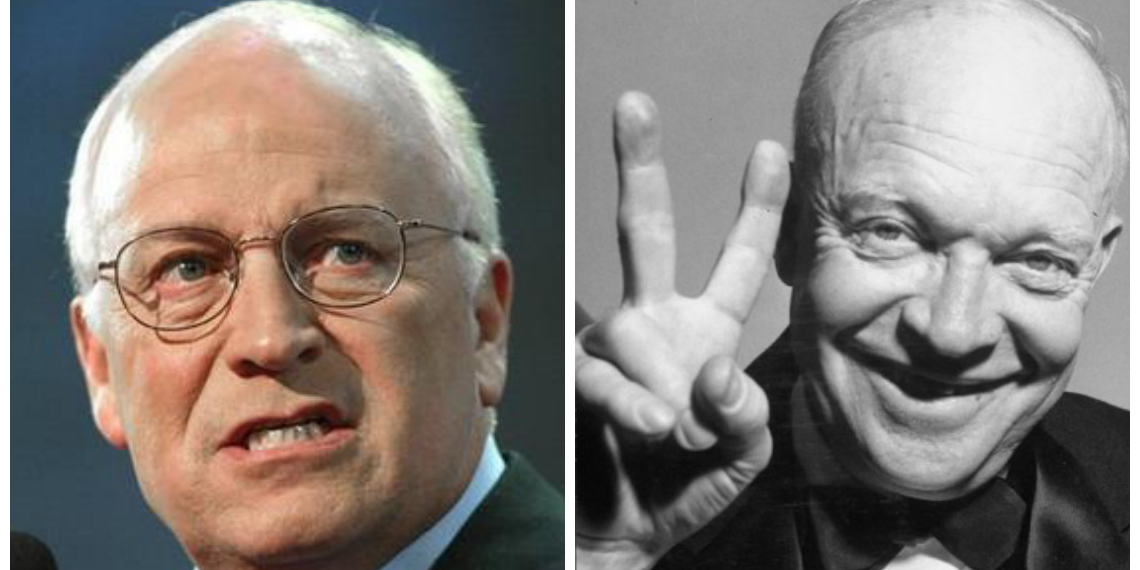In June, former George W. Bush speechwriter Michael Gerson wrote an essay for National Journal titled “1952 All Over Again.” Gerson was referring to the Republican presidential primary that year which pitted the non-interventionist Senator Robert Taft against the more internationalist Dwight Eisenhower.
Videos by Rare
Gerson wrote: “It’s been more than six decades since Republican noninterventionists were this influential. They lost the battle to control the party then—and chances are, they’re going to lose this time, too.”
Gerson was talking about the rise of Rand Paul and his calls for a more restrained foreign policy. Gerson is also not the only Republican hawk or neoconservative to compare Paul to Taft and “isolationism” and themselves to Eisenhower’s more interventionist approach.
But there’s a problem: Eisenhower was significantly more restrained in his foreign policy than Republican hawks today.
Republican strategist and adviser to the 2008 John McCain presidential campaign Steve Schmidt made this point recently on MSNBC’s Last Word with Lawrence O’Donnell:
Look, I think we throw this term around, isolationist. That has a very specific meaning. And the Republican Party, last time we had a big debate on this between the internationalist wing and the isolationist wing of the party, 1952 between Eisenhower and Taft.
But if you look at Eisenhower as the quintessential Republican internationalist, it’s important to remember Eisenhower chose not to intervene militarily in Hungary in `56, chose not to intervene militarily in the Suez crisis. Had a great deal of restraint and a lot of circumspection about the use of American boots on the ground.
So, what is it that we are defining as “isolationism?”
This question should be answered by looking at what those who use the term are criticizing. Dick Cheney, John McCain and Lindsey Graham all think anyone who doesn’t want to go to war in Iraq again is an isolationist. These same three Republicans thought the same thing about those who opposed a U.S. war in Syria. They were just as eager for intervention in Libya.
Michael Gerson agrees with them.
By the standard of today’s hawks, anyone who opposes any proposed military intervention is an “isolationist.”
To the average American this probably sounds ridiculous. It is.
Still, operating on this hyper-interventionist premise, it’s not hard to imagine today’s hawks calling Ike an isolationist too.
Neoconservative founding father Irving Kristol also emphasized this in a 2003 essay for the Weekly Standard. Kristol wrote:
(Neoconservatives’)20th-century heroes tend to be TR, FDR, and Ronald Reagan. Such Republican and conservative worthies as Calvin Coolidge, Herbert Hoover, Dwight Eisenhower, and Barry Goldwater are politely overlooked.
It’s not surprising that Kristol would leave Eisenhower out of the neoconservatives’ pantheon of heroes. Not only would Ike’s refusal to engage the U.S. in certain global hotspots turn off today’s hawks, but our 34th president’s worries about an emerging “military-industrial complex” would not sit well with GOP hawks who called the 2011 sequester budget deal “gutting the military.”
So the debate today between Rand Paul and Republicans like Dick Cheney on foreign policy is not so much a debate between Taft and Eisenhower, as hawks would like to portray. It is between a libertarian-leaning senator who holds foreign policy positions that represent the views of most Americans and old guard, Bush-Cheney cheerleaders who still cling to a foreign policy vision that is arguably more extreme than anything in modern Republican history.
Republican strategist Steve Schmidt asks, rightly:
So what are we defining as isolationism?
Is it the unwillingness to send in a large American land army to Baghdad, to Iraq, for the third time in 20 years? And I don`t think that labeling someone an isolationist because of their opposition to that is going to hold water necessarily in a Republican primary, because I think Rand Paul is where the country is.
Schmidt added, “And I think where he is where an overwhelming majority of Republicans on this issue.”
Disclosure: I co-authored Senator Rand Paul’s 2011 book The Tea Party Goes to Washington.



